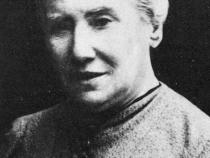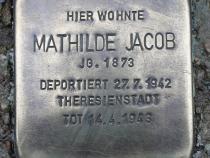Location
Altonaer Str. 26
Historical name
Altonaer Str. 11
District
Hansaviertel
Stone was laid
May 2011
Born
08 March 1873 in Berlin
Occupation
Sekretärin
Deportation
on 27 July 1942
to
Theresienstadt
Dead
14 April 1943 im Ghetto Theresienstadt
Mathilde Jacob was born on 8 March 1873 in Berlin, the eldest daughter of Julius Jacob, a Jewish meat trader, and his wife Emilie. She became a shorthand typist and, in 1907, set up a small secretarial and translation agency in Berlin-Moabit, employing an assistant and an apprentice for a time. Her clients included Rosa Luxemburg, Julian Marchlewski and Franz Mehring. Rosa Luxemburg, especially, valued Mathilde Jacob as a reliable and discreet associate who was always willing to help. During the First World War she became Rosa Luxemburg’s closest confidante, as the latter’s prison correspondence shows. Mathilde smuggled Rosa Luxemburg’s Spartacus Letters and famous Junius Pamphlet out of the prison. From 1917 she also cooperated intensively with Leo Jogiches, and continued to do so throughout the revolution. Mathilde Jacob was certainly present at the founding conference of the German Communist Party (KPD) and probably actively involved.
Following the assassination of Rosa Luxemburg and Karl Liebknecht in January 1919, and Leo Jogiches in March 1919, Mathilde Jacob assumed responsibility for the young party’s finances. Thought to be less under threat, she too was imprisoned from June to September 1919. On her release she joined Clara Zetkin in Stuttgart and started working in the editorial office of “Kommunistin” magazine. She was closely linked to Paul Levi whose political views she shared. In 1921 they both left the KPD. In 1921/22 she worked as editor of the magazine “Unser Weg”, published by the Communist splinter group KAG, and later the newsletter “Sozialistische Politik und Wirtschaft” published by Levi.
In 1922 Mathilde Jacob became a member of the SPD. She continued to run her small secretarial agency in Berlin. Remaining as a rule strictly in the background, she stepped into the public eye only on one occasion. In August 1921, the organisers of the 7th KPD party conference in Jena instructed the Communist Party headquarters to quickly see to the publication of Rosa Luxemburg’s writings. Attempts to fulfil this demand led to Mathilde Jacob, on whom staff at the KPD headquarters maliciously commented: “…the practical accomplishment [of publication] will probably fail because Rosa Luxemburg’s estate is in the hands of a Fräulein who breached party discipline and no longer belongs to the party. It is doubtful that she will hand over the material.”
In response to this, in early September 1921 Mathilde Jacob published a reader’s letter in the USPD newspaper “Freiheit” in which she stridently defended her actions against the Communist Party headquarters’ polemic. “Many proletarians will have wondered who this ‘Fräulein’ might be, whom Rosa Luxemburg trusted so implicitly that she even appointed her custodian of her political inheritance. It goes against the grain to talk about myself. It goes without saying that one does one’s part and continues to do it. I marched as an ordinary soldier in the Spartacist League but I never lost my will to fight, never abandoned my work, like so many attacking heroes who are now ensconced in the VKPD headquarters. I worked for many years before the war with Karl Liebknecht, Rosa Luxemburg, Franz Mehring and many others. I performed voluntary secretarial work for Leo Jogiches through the most difficult time, during the war. The Spartacist League did not have any money so we all, who fought and worked in it, sacrificed our last pennies and devoted all our remaining energies to it. It was considerably more gruelling work than now. It was a constant struggle! We ended up in prisons, workhouses. How difficult it was to get contributions to the Spartacus Letters! Who else wrote for the Spartacus Letters apart from Rosa Luxemburg? All the correspondence concerning them went through my hands, and apart from some tiny contributions by third parties, the only person other than Rosa Luxemburg to write was – the ‘opportunist’ Paul Levi … Today an incredible number have developed revolutionary convictions and call me a ‘Fräulein’. But why is she Fräulein to them and no longer Comrade? Probably because I am responsible [for] Paul Levi’s magazine ‘Unser Weg’. Yes, I avow myself quite openly to Levi’s direction…”
Mathilde Jacob lived reclusively in Berlin until 1933, and little is known about the last phase of her life. In 1936 she tried to leave Nazi Germany but failed. In 1939 she managed to get some of Rosa Luxemburg’s correspondence to the United States. On 28 July 1942 Mathilde Jacob was deported to Theresienstadt concentration camp, where she died on 14 April 1943.
Following the assassination of Rosa Luxemburg and Karl Liebknecht in January 1919, and Leo Jogiches in March 1919, Mathilde Jacob assumed responsibility for the young party’s finances. Thought to be less under threat, she too was imprisoned from June to September 1919. On her release she joined Clara Zetkin in Stuttgart and started working in the editorial office of “Kommunistin” magazine. She was closely linked to Paul Levi whose political views she shared. In 1921 they both left the KPD. In 1921/22 she worked as editor of the magazine “Unser Weg”, published by the Communist splinter group KAG, and later the newsletter “Sozialistische Politik und Wirtschaft” published by Levi.
In 1922 Mathilde Jacob became a member of the SPD. She continued to run her small secretarial agency in Berlin. Remaining as a rule strictly in the background, she stepped into the public eye only on one occasion. In August 1921, the organisers of the 7th KPD party conference in Jena instructed the Communist Party headquarters to quickly see to the publication of Rosa Luxemburg’s writings. Attempts to fulfil this demand led to Mathilde Jacob, on whom staff at the KPD headquarters maliciously commented: “…the practical accomplishment [of publication] will probably fail because Rosa Luxemburg’s estate is in the hands of a Fräulein who breached party discipline and no longer belongs to the party. It is doubtful that she will hand over the material.”
In response to this, in early September 1921 Mathilde Jacob published a reader’s letter in the USPD newspaper “Freiheit” in which she stridently defended her actions against the Communist Party headquarters’ polemic. “Many proletarians will have wondered who this ‘Fräulein’ might be, whom Rosa Luxemburg trusted so implicitly that she even appointed her custodian of her political inheritance. It goes against the grain to talk about myself. It goes without saying that one does one’s part and continues to do it. I marched as an ordinary soldier in the Spartacist League but I never lost my will to fight, never abandoned my work, like so many attacking heroes who are now ensconced in the VKPD headquarters. I worked for many years before the war with Karl Liebknecht, Rosa Luxemburg, Franz Mehring and many others. I performed voluntary secretarial work for Leo Jogiches through the most difficult time, during the war. The Spartacist League did not have any money so we all, who fought and worked in it, sacrificed our last pennies and devoted all our remaining energies to it. It was considerably more gruelling work than now. It was a constant struggle! We ended up in prisons, workhouses. How difficult it was to get contributions to the Spartacus Letters! Who else wrote for the Spartacus Letters apart from Rosa Luxemburg? All the correspondence concerning them went through my hands, and apart from some tiny contributions by third parties, the only person other than Rosa Luxemburg to write was – the ‘opportunist’ Paul Levi … Today an incredible number have developed revolutionary convictions and call me a ‘Fräulein’. But why is she Fräulein to them and no longer Comrade? Probably because I am responsible [for] Paul Levi’s magazine ‘Unser Weg’. Yes, I avow myself quite openly to Levi’s direction…”
Mathilde Jacob lived reclusively in Berlin until 1933, and little is known about the last phase of her life. In 1936 she tried to leave Nazi Germany but failed. In 1939 she managed to get some of Rosa Luxemburg’s correspondence to the United States. On 28 July 1942 Mathilde Jacob was deported to Theresienstadt concentration camp, where she died on 14 April 1943.




